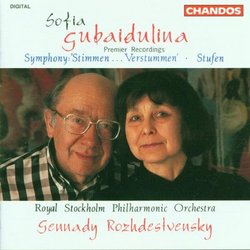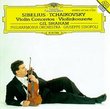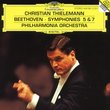| All Artists: Sofia Gubaidulina, Gennady Rozhdestvensky, Royal Stockholm Philharmonic Orchestra Title: Sofia Gubaidulina: 'Stimmen... Verstummen', Symphony in 12 movements; Stufen Members Wishing: 4 Total Copies: 0 Label: Chandos Release Date: 7/26/1994 Genres: Special Interest, Classical Styles: Historical Periods, Modern, 20th, & 21st Century, Symphonies Number of Discs: 1 SwapaCD Credits: 1 UPC: 095115918326 |
Search - Sofia Gubaidulina, Gennady Rozhdestvensky, Royal Stockholm Philharmonic Orchestra :: Sofia Gubaidulina: 'Stimmen... Verstummen', Symphony in 12 movements; Stufen
 | Sofia Gubaidulina, Gennady Rozhdestvensky, Royal Stockholm Philharmonic Orchestra Sofia Gubaidulina: 'Stimmen... Verstummen', Symphony in 12 movements; Stufen Genres: Special Interest, Classical
Like Alfred Schnittke, Gubaidulina (born in 1931) has a strong current of mysticism in her work; her compositions seem to hint at "higher" levels of perception or cognition. Stimmen ... Verstummen (1986) is a symphony i... more » |
Larger Image |
CD DetailsSynopsis
Amazon.com Like Alfred Schnittke, Gubaidulina (born in 1931) has a strong current of mysticism in her work; her compositions seem to hint at "higher" levels of perception or cognition. Stimmen ... Verstummen (1986) is a symphony in 12 movements that race up and down the scales--at times in opposition to one another--in compact, sometimes extroverted sound clusters. In between these flights, the composer repeatedly returns to a stabilizing D-major triad, which allows the work to cohere. This composition's elements are discordant, but its eventual symphonic argument emerges intact and clear. This is perhaps Gubaidulina's greatest work. --Paul Cook Similar CDsSimilarly Requested CDs
|
CD ReviewsMusical vision and originality of the highest order R. Hutchinson | a world ruled by fossil fuels and fossil minds | 02/09/2004 (5 out of 5 stars) ""Stimmen ... Verstummen" (I hear ... silence) is Sofia Gubaidulina's only symphony. It's certainly quality over quantity! Superlatives fail me -- this 1986 composition is among the absolute best orchestral works of the late 20th century. The form is entirely unconventional, with 12 movements, some less than a minute long, and the longest one 11 minutes (34 minutes total). The fulcrum of the work is a trilling, shimmering D major. It opens and closes the work, and reappears several times in between. In between these sublime and mysterious moments there is development, sometimes harsh and dissonant, sometimes striving upward and culminating in great crashing blows. But always the quiet trilling returns. Knowing that Gubaidulina is a deeply religious person, it seems only obvious that the D-major represents God. I can imagine several stories or themes that the seemingly rebellious passages would fit into, but the beauty of music is its openness to interpretation. (The eternal shimmering beauty could be the Dao... ) The second piece, the 18-minute "Stufen" (Steps -- 1992) seems to continue organically from the symphony -- it begins quietly, and then develops into sustained dissonance and development like one of its longer passages. It ends with a spoken passage of poetry, read by the conductor, Gennady Rozhdestvensky. This is a marvelous experience. Rozhdestvensky and the Royal Stockholm Philharmonic Orchestra perform wonderfully -- it is clear that he is perfectly in tune with the composer's intentions. There are many people who cannot find anything to love in modern music. This unorthodox symphony might win many such people over with the recurrent major-key tonality anchoring the brilliant excursions into post-serialist complexity. Sofia Gubaidulina is a prolific composer, but is little-known in the U.S. These works alone should change that, and deserve to be seen as masterpieces the late 20th century music." Sofia Asgatovna and the Sublime R. Hutchinson | 03/24/2003 (5 out of 5 stars) "The Stimmen symphony is one of the great peaks of Gubaidulina's career, a looping, moody work centered around a D major triad and then slowly metamorphoses in and out of itself, moving into an inexplicable transcendence. Stufen, the other work on this disc, is very moving also, but a bit more frazzled than Stimmen. Ensemble and conductor are superb as well. One of the best CDs I've bought this year!"
|

 Track Listings (13) - Disc #1
Track Listings (13) - Disc #1











